|
Since WRESTLING JERUSALEM (the play) premiered in San Francisco in 2014 and then the film in 2016, audiences have asked "Have you shown it in Israel? What do they think?”For four years I’ve had to answer, “We haven’t yet, and we’re working on it.” Well, now we have, and here’s the answer to how Israelis, in Israel, responded to the film:
Their responses were just as wide-ranging as those of audiences in North America. However, there are two main themes that emerged that are unique to Israel. The first: “It’s a wonderful film, very moving, but…we didn’t learn anything new. We know all these stories, all these characters, we live with them every day.” In effect, “it’s very nice, but what’s the point?” The second is a rebuttal to the first: “Actually, we don’t know all these stories. Yes, we may think we know the facts, but Aaron, as an outsider you have brought us these stories we think we know, but you have allowed us to hear them with fresh ears. You are more curious than we are. We don’t go to Ramallah, like you did. We don’t go through the check-points, like you have. We don’t listen to these characters and feel for them. It’s actually important that you’ve come and it helps us see ourselves again.” This argument over the value of the film to Israeli society is notable. The first comment about the film we received was from a woman in the back of the theatre in Tel Aviv. Writer, Sarah Tutle-Singer, (Jerusalem Drawn and Quartered)who was moderating the post-screening discussion, had just begun to reflect on the film when the woman stood up, interrupting Sarah, and shouted, in Hebrew, “I can’t stay but I have to tell you this is the most amazing film I’ve ever seen, everyone in Israel should see this film!” and then hustled out. Another gentleman was not so sure, “I’m depressed at the end of this film. You’ve shown us all these stories and like the metaphor you use of the broken shards, we’re broken, and all we have is the fragments. I find that very depressing.” Sarah quickly responded, “But beauty and hope is in our brokenness. Like the Japanese Art of Broken Things. They take broken pottery and they don’t throw it away, they piece it back together with gold so you can see the cracks and it becomes more beautiful. This film, like all of us here in Israel, holds the brokenness and honors it, and yes it’s depressing, but it’s also beautiful and hopeful. Both are true.” And so the dialectic conversations amidst Israelis about our film continued... We were disappointed not to have screened the film in the West Bank. Discussions for a screening in Ramallah faded as the violence in Gaza erupted just before our arrival. But some very interested audience members from theThe Parents Circle and Combatants for Peacetalked with us after seeing the film and they are working on arranging some screenings in Ramallah, so we’re hopeful that will still happen. It was wonderful to bring the film back to the land where people are living it every day. Context is so important to me as a storyteller. And to screen the film within the context of the narratives of Israel/Palestine was powerful. The Tel Aviv and Haifa screenings felt palpably successful. The room was charged. There was excitement in the conversations. The Jerusalem audience felt subdued. The responses more considered, even tepid. I asked Sara Schwartz Geller afterwards, “How did it go? I can’t tell.” She said, “It was wonderful. An audience in Jerusalem is likely to be more conservative. They are going to be less enthusiastic, but these are the people that need to see the film. If it’s difficult for them, if the film is pushing their edge and making them consider things, that’s what we want. And you’re not necessarily going to feel that they love you.” Ah. Yes. Sara. Well said. The vulnerability I felt at every screening was formidable. The film is a personal account. My experience of longing and learning and listening, deep into this fractured place. And I left the next day feeling the work was received by the hearts and minds of the people who live there. I can't ask for more than that. If you're interested in sitting in on the conversations we had in Israel, we will be posting video of those conversations soon. Stay tuned. I am deeply proud of everyone who worked on and supported this project: My directors Michael John Garcés and Dylan Kussman,whose visions and talents are laced throughout the whole piece; producer Sara Schwartz Geller who worked tirelessly on The Empathy Tour for more than a year; all the artists who worked on the project from the beginning, including the theatre design team, Allen Willner, Nephelie Andonyadis, Stacey Printz and Bruno Louchouarn; filmmakers Nicole Whitaker, Erik Andersen and the entire film crew; stage manager/tech director Wolfgang Wachalovsky who traveled near and far with me; and our executive producers without whose generous support and faith in our project we would have not been able to make the film, Jeannie Blaustein & Peter Bokor, Dan Cohn & Lynn Brinton, Maris Meyerson, Roger Low, and Diane Philips; and Ilana and Chuck Ratner who got the ball rolling for the Israel tour; and the many, many other contributors who gave significantly because they too believed in the value of sharing these stories and staying open to the humanity of the “other.” My wife, Sarana deserves a special mention as well, as she is simply the best traveling companion and support a person could ask for. What happens with the film now? We’re pleased to announce that we have a distribution deal with IndieCan, an independent distribution company based in Toronto. They are working on preparing the film for video-on-demand and international distribution. People will be able to see the film on pay-per-view and/or subscription come next fall. More on that when it’s available. DVDs are still available on our website for contributions that will help us fund the technical preparations for this last phase. What’s next for me? I’m writing a new play about guns in America. I started my research last fall and I have collected interviews from all over the country. I’ll be writing the play this summer. Like WRESTLING JERUSALEM, it will be a solo performance with multiple characters covering this topic. Michael John Garcés is directing. We’ll be showing work-in-progress performances next February at Shotgun Players in Berkeley, in preparations for the world premiere at Mosaic Theatre of DC in April, 2019. But since I can’t seem to stray too far from the Israel/Palestine story, this fall I’m playing the role of Yossi Beilin in Marin Theatre Company’s production of the Tony winning play, OSLO. My mentor and colleague from Traveling Jewish Theatre, Corey Fischer, is also in the production, along with a stellar company of Bay Area actors. Keep wrestling. See you soon. Stay in touch.
2 Comments
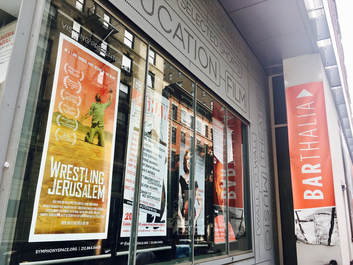 Symphony Space, New York City Symphony Space, New York City NEW YORK | September 2017 I suppose it was only a matter of time. My collaborator Michael John Garcés (director of the stage production of Wrestling Jerusalem) said he was surprised it had taken this long. I was blasted recently in the Santa Fe New Mexican—a rant not a review—accused of being “morally myopic” with our film, which had been presented in late August by Creativity for Peace and the Council on International Relations in Santa Fe. The opinion piece is a sad example of how the commitment to being right can blind us to the possibility of inter-cultural understanding. My accuser derides me for preaching moral equivalency where there is none (I refute the accusation), and by fixating on one facet of this very multi-layered work, my critic has missed the entire point of the film. Ah well…can’t win em all over. Thankfully, our audiences in New York City this month were not so alarmist, and in fact, to the contrary, received the film with remarkably nuanced, thoughtful and heart-felt reflections after every screening. The range of conversations was rich, with artists, activists, journalists, students, scholars and clergy reflecting on the film and its layered, multiple-perspective narratives. Every night 90% of the audience stayed to participate in the discussion. This high percentage of participants continues to validate one of the central assumptions of the project: that people are craving in-depth public conversation about this topic. Enough with over-simplified, polarized debate! The New York premiere on Sept 12 was followed by a conversation moderated by Bloomsberg News reporter and former NY Times Jerusalem bureau chief, Ethan Bronner with director, Dylan Kussman, executive producer, Jeannie Blaustein and me. Ethan noted, rather poignantly during the discussion, that the characters in the film are, sadly, timeless, in that they could have been people he met when he first got to Jerusalem in the early 90’s. Dylan talked about his initial inspiration to make the film as a mission to share the message of the piece with as many people around the world as possible, and Jeannie shared the insight that while the film creates a necessary conversation, it is not an easy one. Jeannie couldn’t be more on-point. Our whole team stands by that un-ease. For a host of reasons that go back hundreds, if not thousands of years, Jerusalem is a lighting-rod and to truly wrestle with this ancient city is to lay ourselves bare to multiple truths, and that is uncomfortable. And it’s also a necessary part of the process of creating a just and lasting peace. 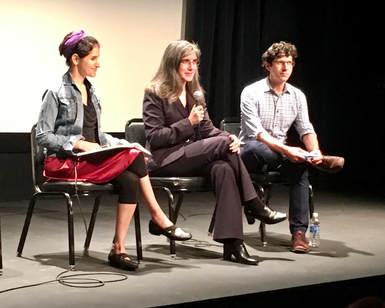 Rabbi Jessica Kate Meyer, Rabbi Marisa James and David Chapman Rabbi Jessica Kate Meyer, Rabbi Marisa James and David Chapman The second night in NY, the film was followed by a conversation lead by Rabbi Marisa James of CBST, with Rabbi Jessica Kate Meyer of Romemu and David Chapman of New Israel Fund. This gathering of minds delved deep into the symbolic layers of the film, reflecting on how one person playing all the roles specifically models how to create an empathic self, and the discovery that many characters were surprisingly teaching Torah. I was so moved by the level of intellectual engagement with the work. Dylan and I found it very gratifying to have the film deeply received on so many levels. Art needs to be truly critiqued to help it open up and find its place in the broader conversation. Of course by criticism, I mean an engagement to set a work of art in its context in terms of both form and content and to help digest the layers and meaning of the work, which the artists aren’t even necessarily aware of themselves. I’ve learned a great deal about what we made with the piece—both the film and the play—by listening to others reflect on what it means to them. 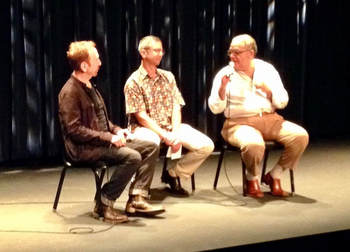 Aaron, Andy Ingall and Ruby Namdar Aaron, Andy Ingall and Ruby Namdar The third night, our NY outreach director Andy Ingall moderated a discussion with me and Israeli novelist Ruby Namdar, who won Israel’s highest literary award, the Sapir, for his novel The Ruined House, (to be published by Harper Collins in English in November). Andy paired us together with the idea that Ruby, an Israeli writing about Americans, and I, an American writing about Israelis and Palestinians, would have a lot to talk about regarding insiders and outsiders and who has the right to tell whose story. Ruby talked about the thin membrane that separates us when we create, no matter who we’re writing about. And so there is no difference if you’re writing about your native culture or about the culture you’re witnessing from the outside, if you come bearing no armor to separate yourself. I found this to be such a profound reflection and true to my experience of both writing and performing WRESTLING JERUSALEM. The divide between self and other was in constant flux during the generative period as I constantly was facing the layers inside the questions who am I? And who are you? And who are we in relation to each other? Of course, in the performance, the divide between self and other is completely demolished, if I am to be truly inhabiting the character other than myself. Emotional alchemy, I suppose. Then Ruby turned to me and asked, “are you okay? I worry about you.” I smiled. “How long can you survive with such a thin membrane as I witnessed in the film?” he asked. We went out afterwards with another Israeli writer, Yonathan Berg, drank whiskey and talked late into the night about the erotic nature of politics, the difference between American and Israeli sense of personal space and the challenges of living in the age of identity politics. The fifth night, two J Street U students from Barnard and Hunter college talked about the work they’re doing on campuses and the challenges they face engaging in the politics of Israel/Palestine. I was impressed by their commitment and by their desire to connect with other students across lines of affiliation. When I asked them what their greatest challenge is at the moment, they said it was the agenda of forces outside of campus trying to tell them what they needed to do, including formal institutions in the Jewish community wanting them to push back against anti-Israel activity. They wanted to be left alone to work on the issues themselves. I asked for examples on how they’re working on it. One example they gave me is what they call “one-on-ones”, where one student asks another student who may not agree with them on the issues, to sit down together for a coffee and just talk. They share their stories with each other, trying to allow themselves to be "vulnerable and real". Of course this was exactly what I had done during the research phase before writing Wrestling Jerusalem and I was heartened by their sense that they were making progress one person at a time. If these students are the future, there is hope! On Friday my good friend and colleague, Ari Roth, artistic director of Mosaic Theatre of DC, lead a conversation with Philip Himberg, artistic director of Sundance Institute Theatre Program and filmmaker, Juila Bacha, (director of Budrus). I joined them and Dylan chimed in here and there from the back of the theatre. Ari beautifully framed the film as capturing and preserving an historical performance. I didn’t quite know what he meant. While I’m certainly proud of the work, I’m not sure it’s historical. He went on to explain that we don’t memorialize theatre performances often. They’re ephemeral. He said that this piece grew out of a seed that he and I planted together, and it grew, as we each grew, over the past ten years. He credited Dylan for preserving a work of art, and even enhancing its breadth and depth for cinema, and making it possible for audiences to tap into this moment with us, for years to come. He and I reflected on the politics in the U.S. at the moment he commissioned me to write a play, in 2007, and the questions we were facing about what could and what could not (read, what should and what should not) be talked about re Israel/Palestine in the public spaces, and specifically in the public Jewish spaces. The play was created to push those edges. In some ways our public spaces have evolved, and in some ways they’ve devolved. Looking at the censorship Israeli artists are facing right now from the Culture Ministry, in Israel, for sure, they’ve DEvolved. Philip reflected on how the piece moved him and recalled an early workshop we did on the play together in Los Angeles that was nearly shut-down because of one right-wing board member of the new theatre that was presenting us. And Julia reflected on the film through the frame of her own work as an outsider. As a Brazilian documentary film maker, she has been able to work on the Israeli-Palestinian conflict with a kind of critical distance saved for outsiders. 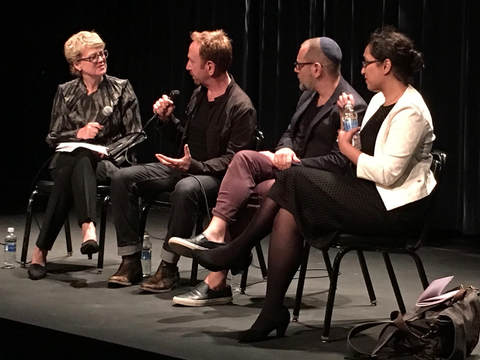 Katherine Henderson, Aaron, Rabbi Amichai and Irfana Anwar Katherine Henderson, Aaron, Rabbi Amichai and Irfana Anwar On the final night, Katherine Henderson from Auburn Seminary moderated an interfaith conversation with Rabbi Amichai Lau-Lavi, a dear friend and spiritual leader of of Lab/Shul, and Irfana Anwar, a women’s rights attorney and fellow of the Muslim Leadership Initiative of the Shalom Hartman Institute. This was a rich conversation on many levels and I wish we had recorded it. A few highlights: Amichai saw the film in relation to the current clash between the surging "non-binary" world who embrace multiplicity, complexity and diversity and the people who are clinging to a very "binary" world and are reacting to this surge of integration as a profound threat to their identity, power and way of life. In this light, the film goes much farther than the Israel/Palestine debate. Irfana talked about how she came into the theatre that night apprehensive about what a white, Jewish man would have to say about the Palestinian narrative. She was won over by what she called the “radical empathy” of the film. She was particularly taken with a portrayal of a Palestinian woman, when she realized that in the film, I was “carrying water for the other side”. She spoke about how troubling it is when one group of people is speaking for another group (and rightly so), but she felt in this instance it worked because of the dignity and humanity given to all the characters. I could not have asked for a more generous response to our film. 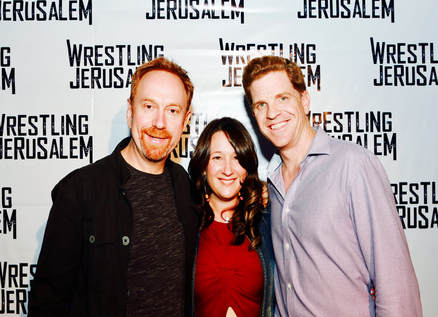 Aaron, producer Sara Schwartz Geller and director Dylan Kussman. Aaron, producer Sara Schwartz Geller and director Dylan Kussman. In summary, the New York premiere felt to me like a threshold moment for the project. I’ve been living inside this work for many years now. By some accounts 10 years, since it was in 2007 that I performed the first public readings at Ari Roth’s Voices from a Changing Middle East Festival. But it wasn’t until the fall of 2013 that I went into rehearsal with Michael John Garcés that this became my full time focus--so the more immersive timeline is 4 years. No matter, it feels like quite a long time to be with one piece, particularly these days when work is often rushed for budgetary reasons. Most new plays receive only one production and films are crammed into the pipeline to keep the pace with our world hell-bent on charging ahead. I’ve learned the commitment it takes to allow a piece to mature and I’ve benefited from growing with it. I’ve watched as its meaning continues to evolve—even as the text has stayed the same. There have been many times I’ve been ready to let it go, and yet have found time and again that it will not let me go. And so, while we continue on our Empathy Tour as producer extraordinaire, Sara Schwartz Geller fastidiously works on lining up screenings in Europe and the Middle East, (we're working on translation into Arabic, Hebrew, French, German and Russian) and our campus and community screenings continue through the 2017-18 season, and my technical director, Wolfgang Wachalovsky dusts off the backdrop for a 3-week run of the live performance at Philadelphia Theatre Company in October, I’m actually readying myself to let it go and carve out some precious time to create some new material. I'm excited to dig into new terrain. How fortunate that filmmaker Dylan Kussman had the inspired creative vision to make a film so that the project can continue to deliver its its message with or without me. More than two years ago my longtime friend, filmmaker Dylan Kussman, came to a rehearsal of WRESTLING JERUSALEM (the play) in Los Angeles. It was the first run-through off-book (lines barely memorized) with my director Michael John Garcés, artistic director of Cornerstone Theatre Company, where we were rehearsing for a few weeks thanks to their generosity. Dylan and Michael were the only ones in the room. I've known Dylan for over 20 years so I wasn't nervous about him being there. In fact, I was excited to have someone new to share the play with. I had been working on the text for years, and yet I was just beginning to face the very real task of actually meeting this huge amount of material with heart and presence; with focus and commitment; with passion and compassion. That is to say, I was still very much in rehearsal. Dylan watched the run-through. I was relieved to just get to the end of the thing without collapsing. Afterwards, we stepped outside onto Traction Ave. in the newly hip Arts District not far from downtown Los Angeles. Michael would give me notes after our break. Dylan and I sat down at a café table on the street. We each ordered a cup of coffee. I was wiped out from the run-through. My throat was dry. I downed a glass of water. Dylan was quiet. We didn't say much at first. Each in our own little world. Finally he looked up at me. "You have something very special here, Bro. Really. I'm not really sure what else to say. Everyone has to see this. Everyone." He had tears in his eyes. That's all he said. I could see him grappling with what he'd just seen. I didn't know if the piece was any good. You never do, with new work, until people see it. Until its fully formed and has time to live in front of an audience. And this was so early in the process, all I could think about was the enormous work I had ahead of me to get it right. To get it performance-ready. Michael and I had so much work to do. A mountain still to climb. But that day something was sparked in Dylan. And like a dog with a bone, he didn't let it go. Six months later, after Michael and I and our stellar design and production team wrestled this play into full production, Dylan came up to San Francisco for the premiere run at Intersection for the Arts. It was March, 2014. After the performance, he came backstage into the dressing room. He gave me a hug. He sat down. Again, he was quiet. Again, I was wiped out from the performance. Again, I was guzzling a glass of water; catching my breath. After a while he said, "This may sound crazy to you, but I have an idea...." That idea became this movie. This movie has had more than two hundred people involved in its creation. Um, 200... From the artists, to the crew, to the financial contributors, to the post-production technicians, it took a whole lot of people a whole lot of care and persistence and spirit to bring this film to completion. I'm humbled by the effort. I'm thrilled by the community we've built. I'm inspired by the prospects of our reach. I'm proud of what we've made.
The goal: to craft a film that would create the opportunity for as many people as possible to consider the message of the piece, be entertained by its story and be moved by the collection of voices that make up the project's humanity. Maybe, just maybe, after seeing this film, you might view the world a little bit differently. We are all complex. We are all wrestling. We all want to live free. I recently completed performance #129 of WRESTLING JERUSALEM at Cleveland Public Theater. We started keeping track of the number of performances back in the Fall. Partly so I could track the approach to performance #100, which I hit in NY, and which felt like a real milestone. But I also wanted to see, in numbers, the accumulating momentum of the project. What began in the Spring of 2014 at Intersection for the Arts in San Francisco—the initial 16 performances—has now taken me and this play to cities around the country including Minneapolis, Houston, Washington DC, Providence, Boston, Juneau, Los Angeles, New York and more. Nearly 14,000 people have seen the play, and half as many have participated in facilitated post-performance conversations. These conversations continue to be rich and full of vulnerability, curiosity and nuance.
We are the sum-total of our experiences, and as our contemporary culture descends more and more into partisan, tribal allegiances, the variation of our experiences is diminished. We surround ourselves with like-minded people. As we grow more self-righteous in our hardened positions, we grow more shallow. We do not understand “the other” because we do not want to. We just want to be right. This is the climate we’re living in, and it’s not just about Israel/Palestine. Whether we are pro-Israel, pro-Palestine, pro-Hillary, pro-Bernie, pro-Choice, pro-NRA, or whatever, we are losing the capacity to empathize with those that are different from us, because we never have contact with them. The recent Frank Bruni Op-Ed in the New York Times, How Facebook Warps Our Worlds, reflects on the algorithms of Facebook that are specifically designed to keep us seeing only what we want to see. Of course this is driven entirely for the marketplace: if I like blue cars, they show me blue cars. But when these algorithms point us towards news, cultural information and political perspectives, we're only reading what we already believe and we wind up burrowing deeper and deeper into our silos. As Bruni points out, Facebook’s self described mission is to bring the world closer together, but in many ways our world continues to grow farther and farther apart.
activist; that I give the same due to the Israeli father whose kid was killed in a suicide attack as I do to the Muslim teenager shot by the IDF. It’s not an exercise in moral equivalency, though my critics would say that it is. To me, it’s an exercise in acknowledging the subtleties of the very human experiences that got us here. We cling to the narratives that explain our own experience. And yet, if we don’t make the effort to look beyond our own narratives, beyond our own experiences, we’re bound to remain stuck inside our own shrinking world. If we happen to be the ones in power, then why should we listen to other side? We risk losing power. If we’re the ones not in power, why should we listen to the other side? We risk losing our very identity, and everything we fight for.
conversation, even as I grow more weary that the opposite is happening in so much of our public discourse. I set out to write a play that covered multiple perspectives and would stand for a rebuke against polemic concerning Israel/Palestine. The public discourse has grown so toxic I wanted to bring to light the varied human beings that live in the middle of this conflict, that it might remind us of our own humanity. But I did not realize I was writing a play that would firmly push back against the deeply positional discourse that dominates so many of our political and cultural conversations. How do I know it’s working? One sign is that Google has hired me to present WRESTLING JERUSALEM as an integral part of an on-going executive training on “Complexity and Collaboration.” Google executives from around the world come together for this training, and the play (or film) is being used to explore the practice of holding multiple perspectives. These executives are influential leaders who make decisions that affect people all over the world. They are faced with complicated problems and have to work with people of different backgrounds. WRESTLING JERUSALEM helps expand their sense of “other”, and gives the opportunity to engage with a work of art that invites them to be bigger, more generous, more curious, more thoughtful human beings.
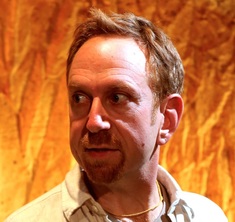 A friend of mine, who is a Professor of Jewish Studies, once said to me “saying Israel at a dinner party is like yelling fire in a crowded theatre.” The word alone elicits pandemonium. I’m exaggerating. Kind of. Maybe not scenes of people screaming and running for the exits. But certainly a room engaged in heated debate; family tensions high; friendships tested. For those who love the Jewish state, she is noble and necessary; a harbor for Jews in an inhospitable world. For those who loath the state, Israel is a domineering colonial force built at the expense of another people who, at best live as second class citizens, and at worst live as prisoners in a land they have called home for generations. Which side are you on? The polemic is tempting. But those of us who traffic in the arts, and particularly in the dramatic arts, know that just beneath the surface of polemic lay the dynamic, robust world of complexity and nuance. That is to say: the messy truth of humanity. There is no black and white. There is no hero and villain in this story. It’s a big stinky muddle of political maneuvering, violent struggle, ethnic allegiance, spiritual yearning, international migration, remarkable success against so many odds, unbearable loss, unending frustration, and so on… I wrote WRESTLING JERUSALEM to answer the question: How do you feel about what’s going on in Israel? The power and beauty of theatrical storytelling is that it can bring forward a big narrative on human terms. For us in America, the struggle between Israelis and Palestinians is usually played out in the headlines and on the television news; in Facebook posts and Tweets; at college campus and civic rallies. It's mostly brief, rarely illuminating and often intellectually thin. But real human beings live inside this conflict every day. WRESTLING JERUSALEM presents a range of voices. There are seventeen different characters in the play. Israeli, Palestinian, American, British, men, women, who each have reflections about their lives that illuminate aspects of the conflict and, hopefully, open our hearts to their perspectives. It’s a solo performance. The characters are presented by me, as I try to grapple with the complex issues they bring up and understand for myself how to make sense of it all. One kid asked me after a performance, “How do you do all that without going crazy?” I responded with my own question, “How do you know I’m not crazy?” “Good point,” he said. Maybe I am crazy. Or maybe I’m just committed to pushing past the limitations that are presented to us, and that we even accept for ourselves. The play is enjoying incredible success with a national tour that begins in October at the venerable Guthrie Theatre in Minneapolis, which is now under the leadership of Joe Haj, the only Palestinian-American Artistic Director of a major theatre in America; then to the Houston JCC; Toronto, where Sara Schwartz Geller, my former partner at Traveling Jewish Theatre, is producing independent work; and Mosaic Theatre of DC, the new venture of Artistic Director Ari Roth who commissioned the play back in 2007; then we head to Perseverance Theatre Company in Alaska; then to New York City for a 4 week run at 59E59 Theatres; and Cleveland Public Theatre. 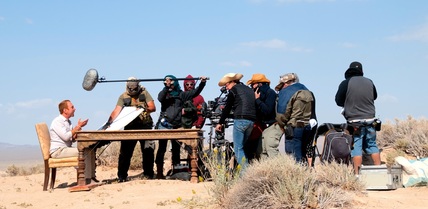 On location in the Mojave Desert. On location in the Mojave Desert. If that weren’t enough to keep me busy, we’re making a feature film! Shot on location in the desert, in a dressing room before a mirror, and on stage with a live audience, the film, directed by LA based filmmaker Dylan Kussman, will intercut between those spaces and translate the solo performance into cinema. Sponsored by the San Francisco Film Society, the film is a big effort, with a 26 person crew out in the Mojave Desert for 5 days back in May where we got some incredible footage. And a 5 day shoot starting September 29 at Marines Memorial Theatre in San Francisco where we will film the interior scenes, culminating in a LIVE PERFORMANCE TO BE FILMED October 3. My team and I are thrilled at the community support that has come together for the filming of the live performance, with co-sponsors from a terrific cross-section of Bay Area arts, faith-based and community organizations. It was a significant step to rent Marines Memorial Theatre, a 560 seat theatre in San Francisco’s theatre district, so we need all the community support we can get! I never dreamed the project would take on the life that it has. I suppose it’s a testament to the fact that people are tired of the status quo, and that we’re all searching for a way forward. WRESTLING JERUSALEM doesn’t provide one solution, but it does offer up the possibility that by deep listening we can better understand one another and, together, find a way to create lasting peace. For more information on tickets, the tour and the film: wrestlingjerusalem.com |
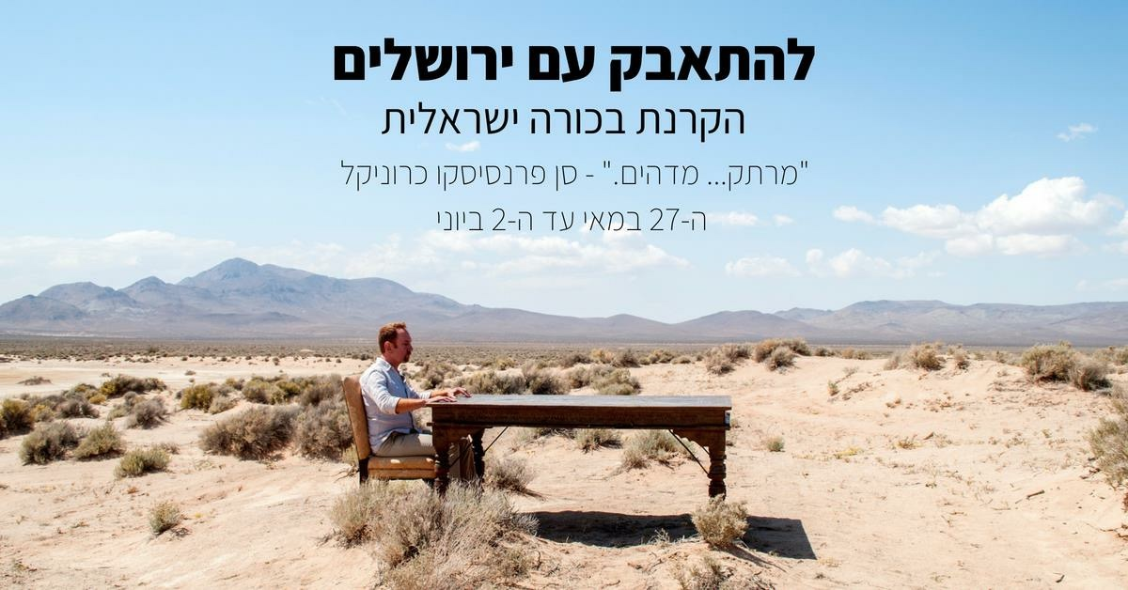
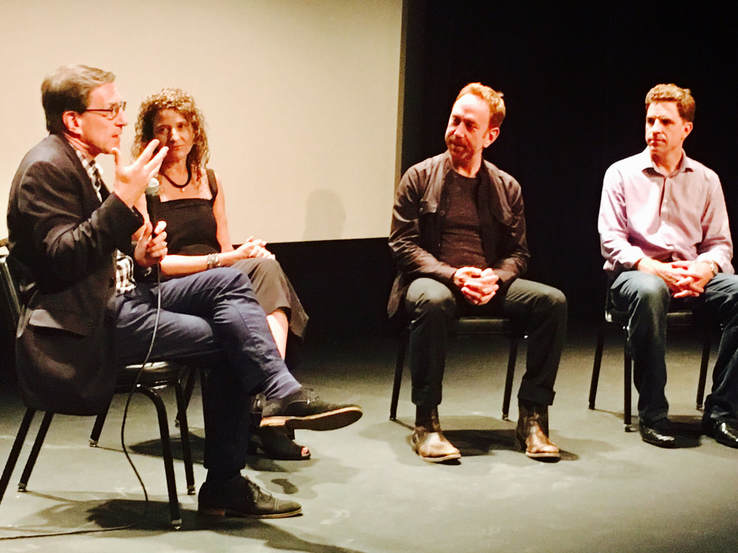
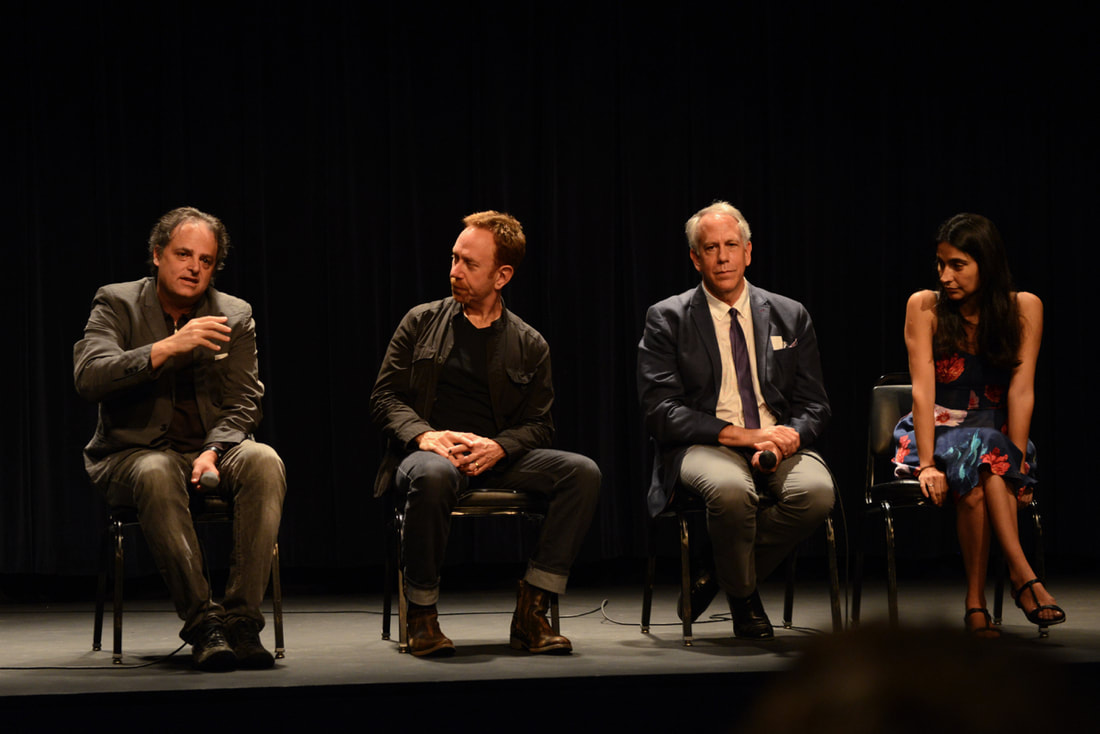
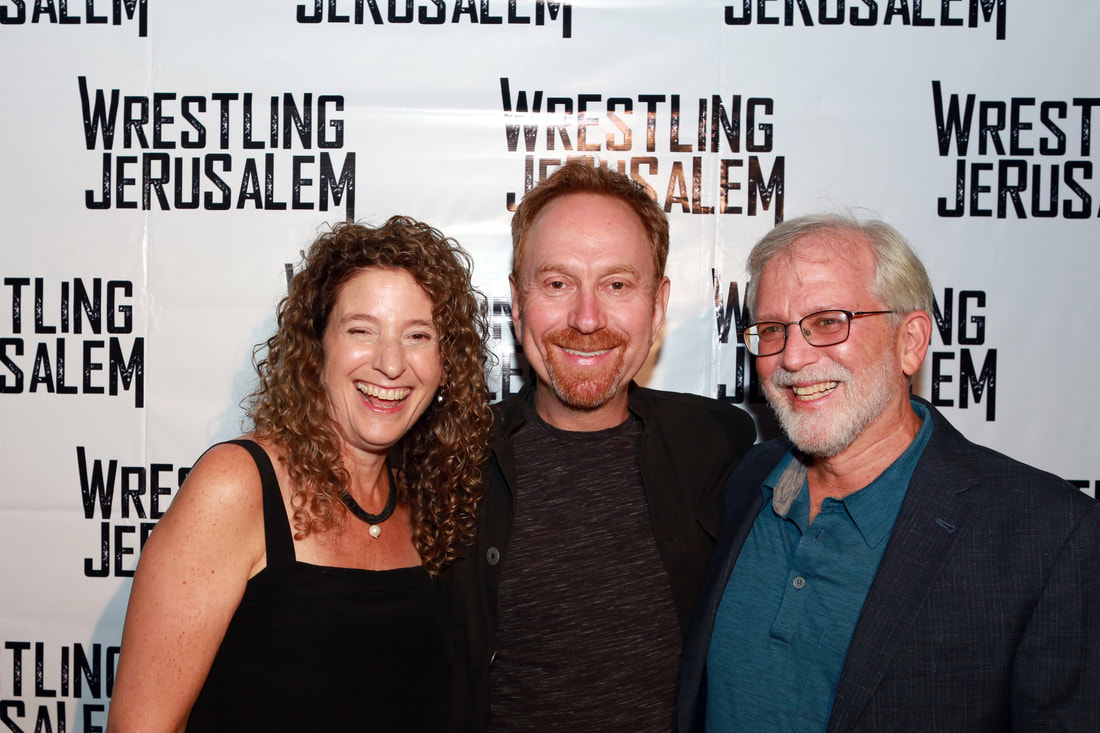
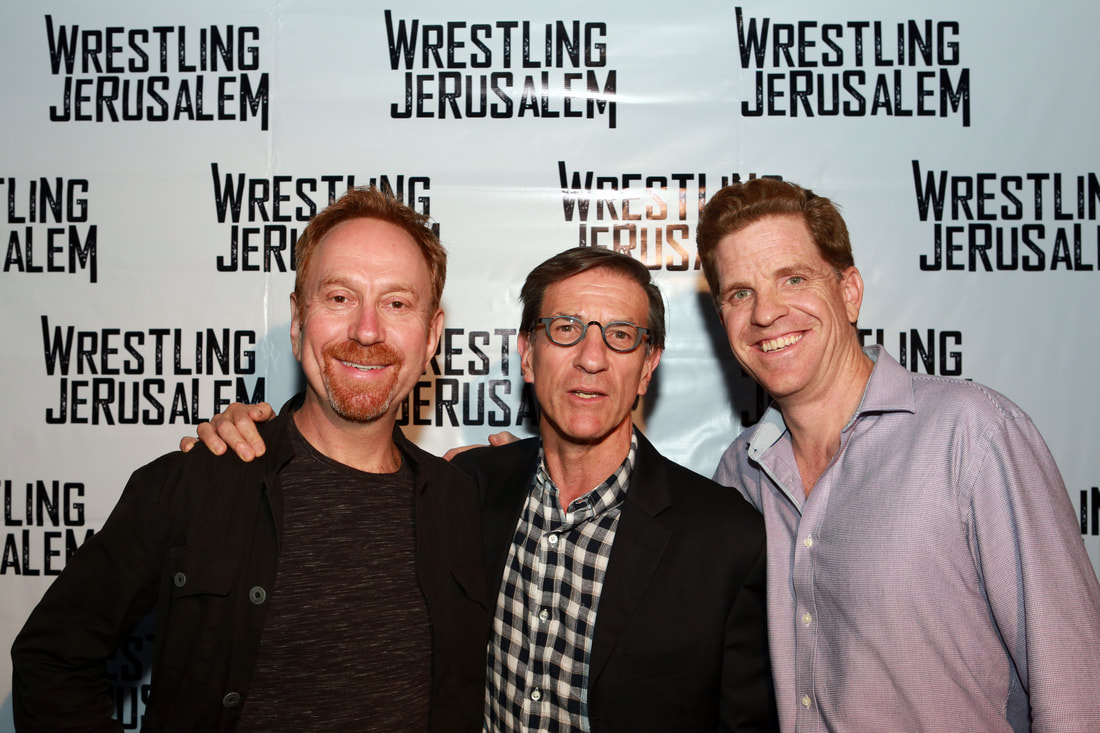
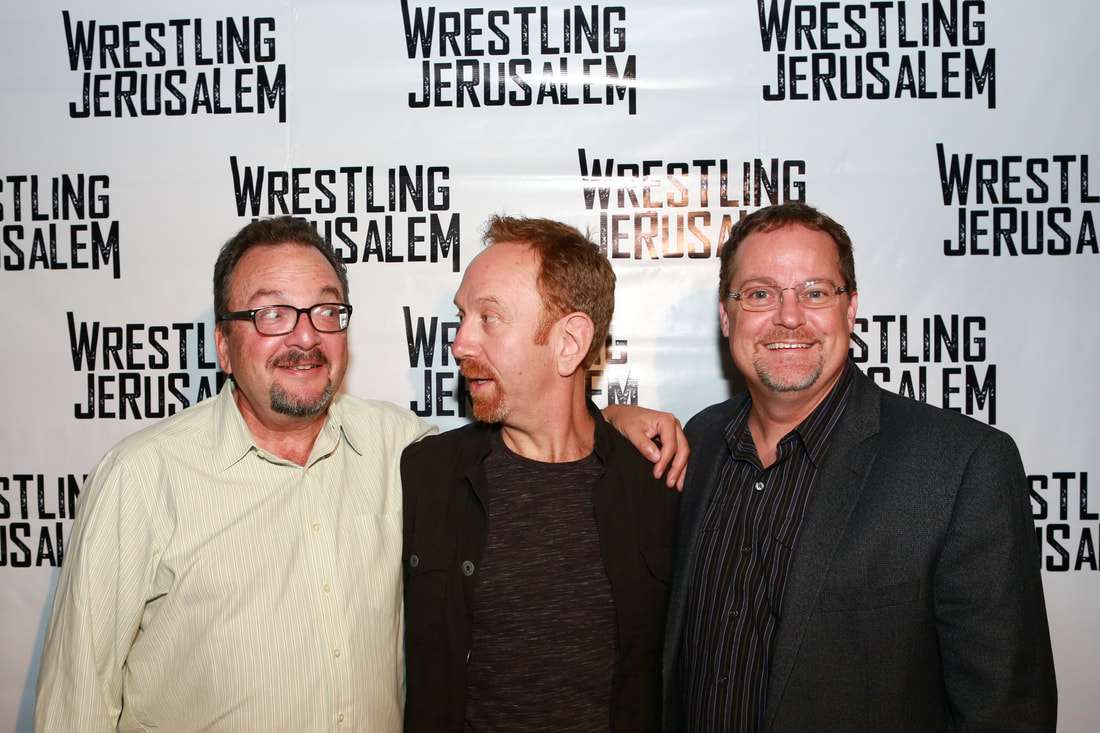
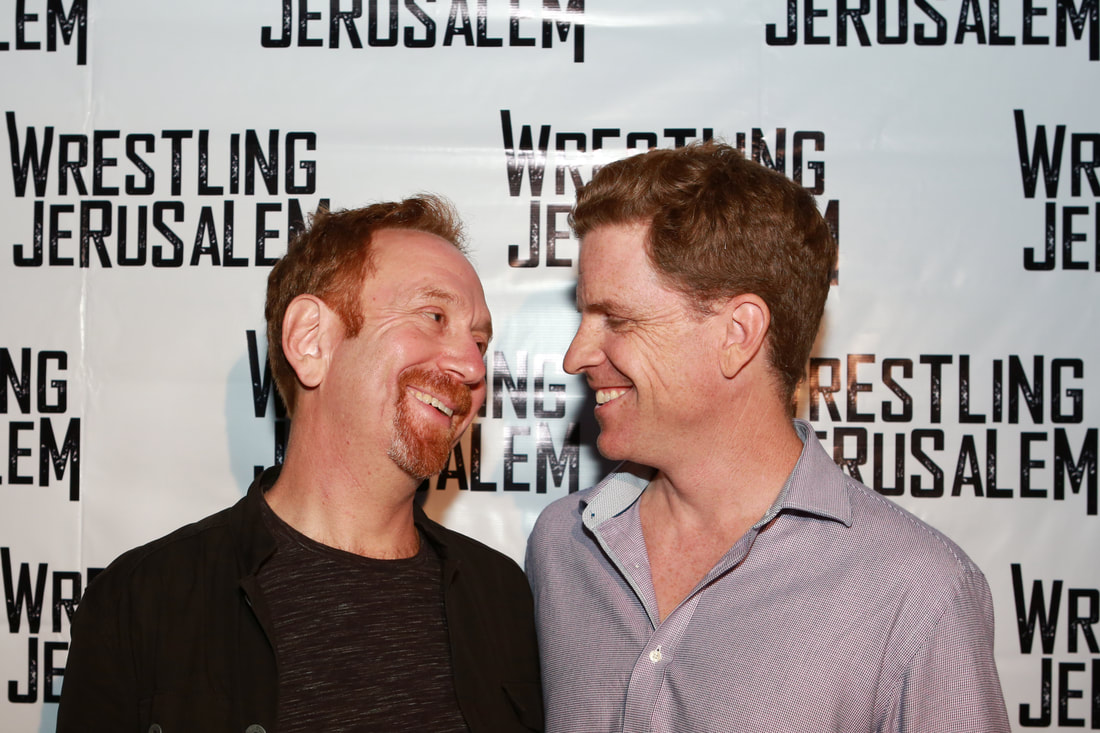
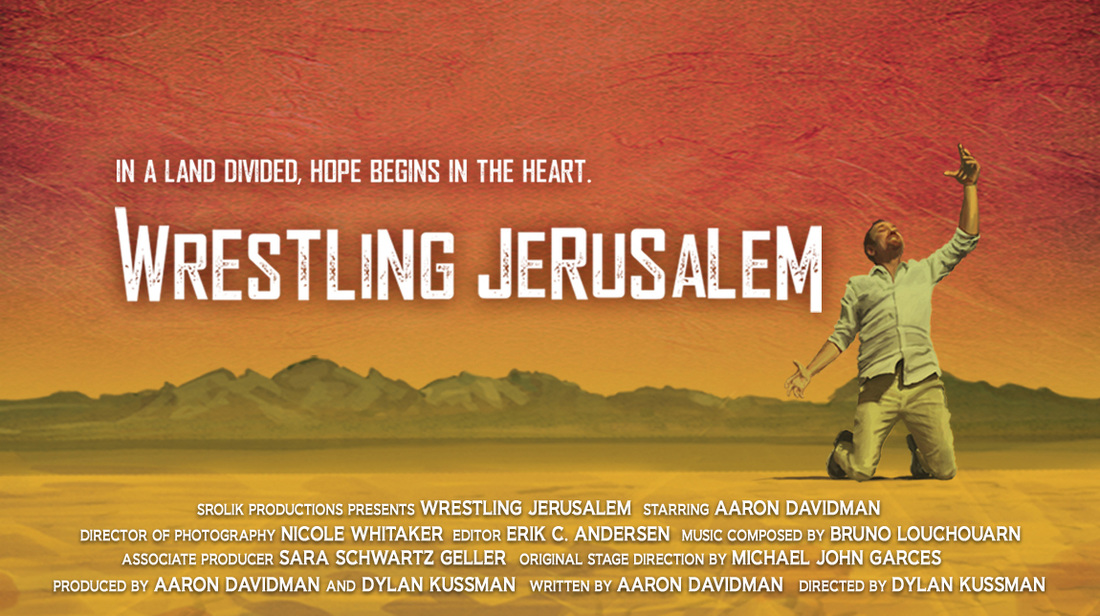
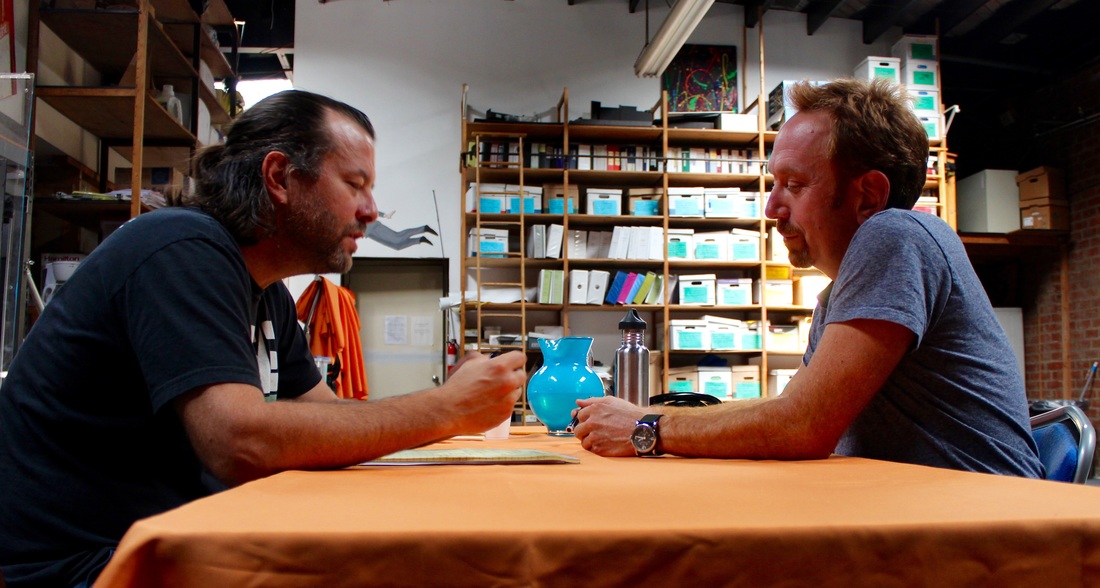
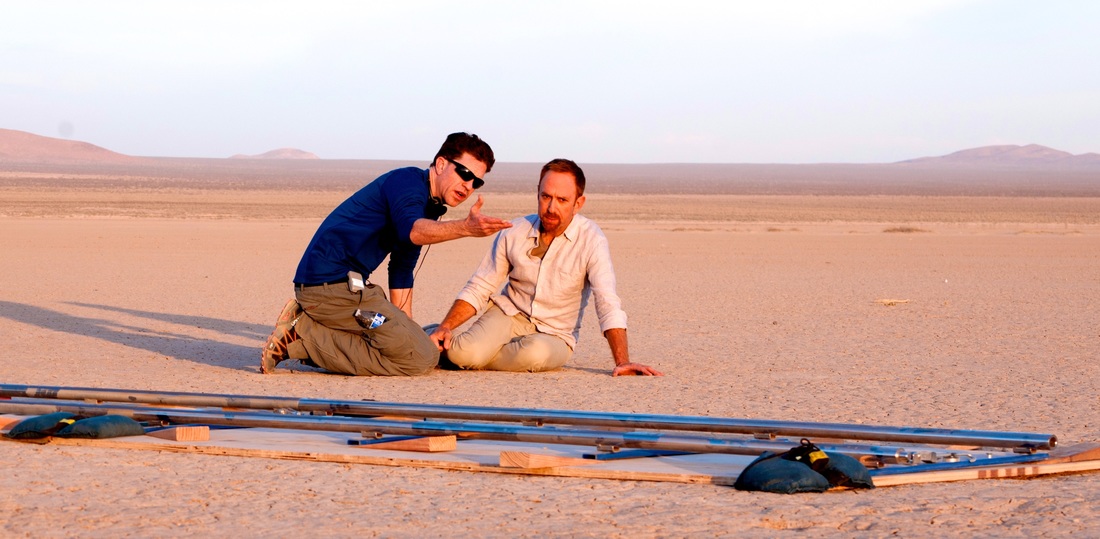
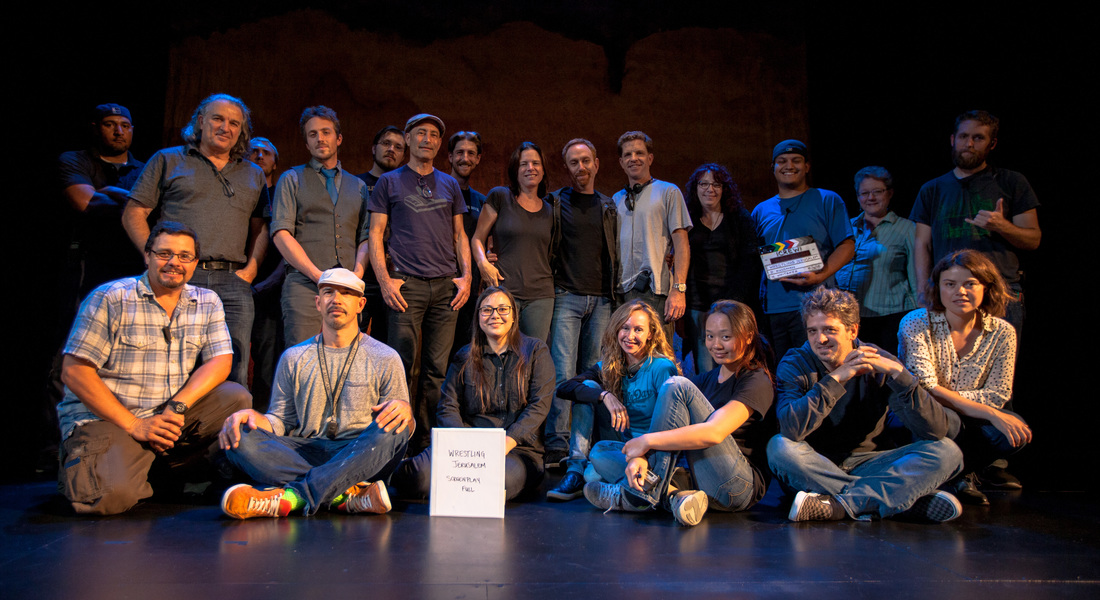
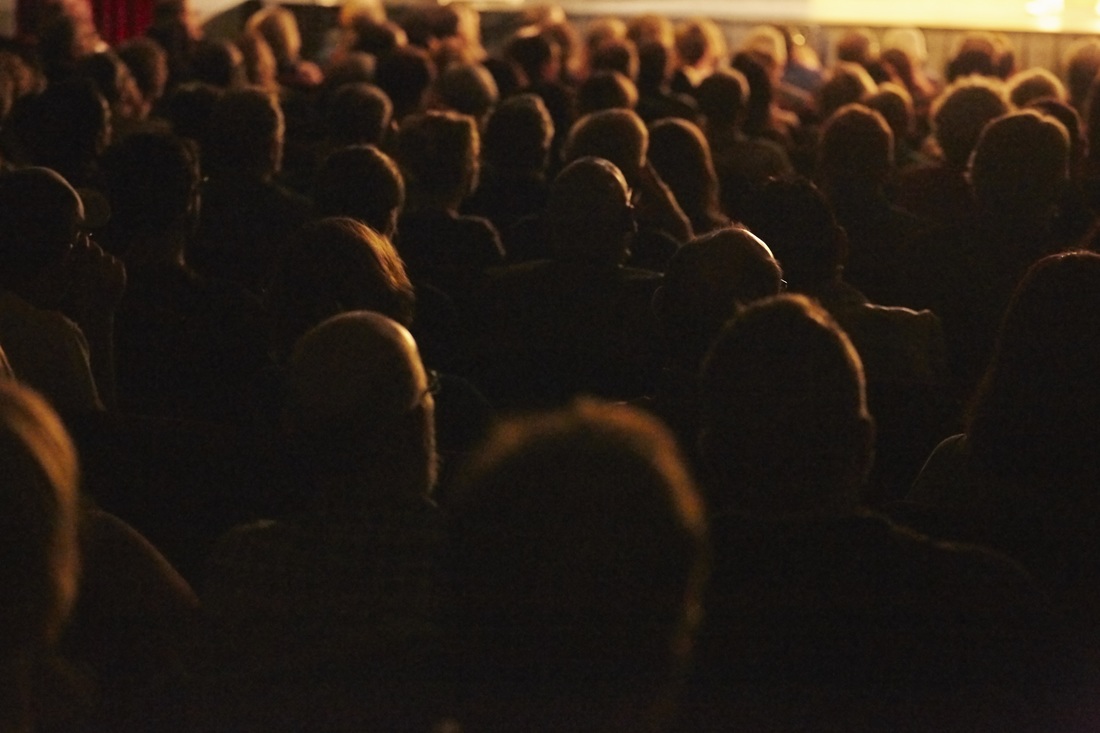
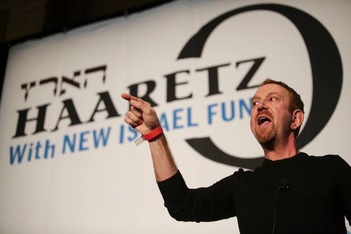
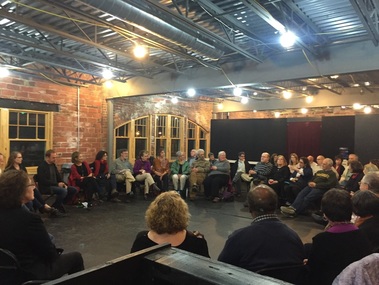
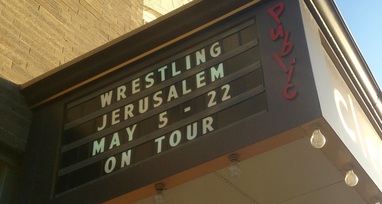
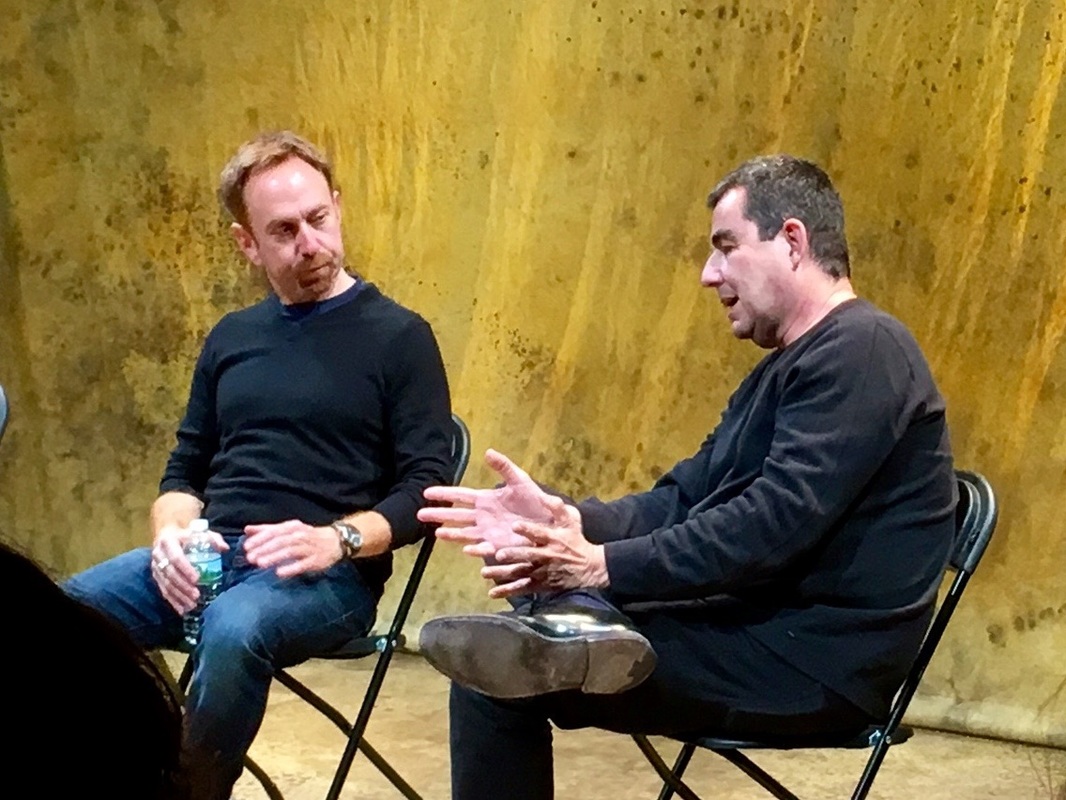
 RSS Feed
RSS Feed
